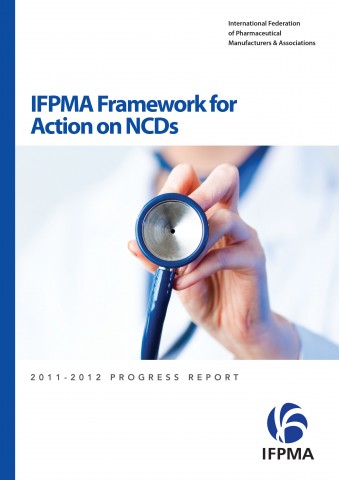
- The Johns Hopkins University report identifies systemic gaps in NCD research, policy and practice
- Offering pragmatic actions and sustainable solutions, experts cite multisectoral cooperation as vital
- Independent research project stems from IFPMA Framework for Action on NCDs, focusing on innovation, access and affordability, prevention and health education, and partnerships
The four main NCD categories – cardiovascular disease, cancer, chronic lung diseases and diabetes – kill three in five people worldwide. Nearly 80% of NCD deaths occur in low- and middle-income countries.
As part of momentum from the 2011 United Nations High Level Meeting on the Prevention and Control of NCDs, a working group of leading scholars1
Today the Johns Hopkins University’s Institute for Applied Economics, Global Health and the Study of Business Enterprise released a focused set of policy briefs that provide actionable recommendations for improving NCD policy, research and, ultimately, care. The study was commissioned by the International Federation of Pharmaceutical Manufacturers & Associations (IFPMA). Addressing the Gaps in Global Policy and Research for Non-Communicable Diseases. Their findings provide decision-makers with five key areas for action: 1) strengthening supply chains, 2) accelerating regulatory convergence, 3) applying HIV/AIDS learnings to improve access to interventions, 4) restructuring primary care, and 5) promoting multisectoral action. 1produced this collection of briefs:
“We harnessed the direction given by UN Member States in the NCD Political Declaration as a springboard for action,” said Sir George Alleyne, former director of the Pan American Health Organization (PAHO), and co-author of one of the briefs. “Based on this direction, our work paves a way forward to achieve better health outcomes through multisectoral and intersectoral cooperation.”
Eduardo Pisani, IFPMA Director General, said, “The research-based pharmaceutical industry commissioned these briefs to generate ideas which we hope will contribute to WHO discussions and provide a path forward where our industry is best prepared to play its part with other stakeholders”.
1 Authors include: Brian White-Guay, Lisa Smith, Prashant Yadav, Soeren Mattke, Margaret Kruk, Felicia Knaul, Gustavo Nigenda, Sir George Alleyne, and Sania Nishtar. Jeffrey L. Sturchio and Louis Galambos served as editors.













